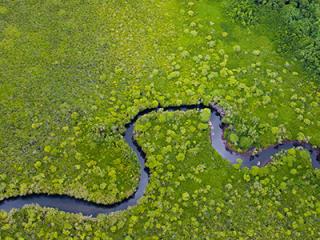
Somatic Pedagogy Training
EN | Cross-method teaching of somatics in a group context
A pedagogy of relatedness
After the first year of the Somatic Basics Training (Part 1), the Somatic Pedagogy Training (Part 2) focuses on practical deepening and the ability to facilitate and guide individuals and groups in somatic work. The Somatic Pedagogy Training establishes the second and final prerequisite for professional certification and recognition by ISMETA, the International Somatic Movement and Therapy Association.
The Somatic Pedagogy Training also provides an insight into the history and philosophy of somatics, its theories, principles, delimitations and its critical reflection within our current cultural context (Critical Somatics).
Through the analysis of human movement development and through the specific and synergistic attributes of the somatic methods taught, the material can be absorbed and integrated in an embodied and cognitive way, thus supporting sense-making, choice-making and acting in the world.
On the one hand, understanding the principles of the individual methods gives students the opportunity to survey a large part of the somatic professional field. On the other hand, the student gains the ability to use these principles as a basis for their own authorship and application.
The Somatic Pedagogy Training is certified by the international professional somatic association ISMETA. Participants of our certified Training enjoy several benefits and discounts. >> more info
---
300 hours / 10 modules / 8 somatic methods / 4 facilitators
Ausführliche Seminarinformationen
The Somatic Pedagogy Training also provides an insight into the history and philosophy of somatics, its theories, principles, delimitations and its critical reflection within our current cultural context (Critical Somatics).
Through the analysis of human movement development and through the specific and synergistic attributes of the somatic methods taught, the material can be absorbed and integrated in an embodied and cognitive way, thus supporting sense-making, choice-making and acting in the world.
On the one hand, understanding the principles of the individual methods gives students the opportunity to survey a large part of the somatic professional field. On the other hand, the student gains the ability to use these principles as a basis for their own authorship and application.
Which didactic principles were experienced?
In the interplay of different methods such as Continuum, Feldenkrais Method, Middendorf's Breath Experience, Body-Mind Centering®, experiential anatomy, Authentic Movement, Somatic Yoga and Somatic Voice, experiences and cognitive processes arise that are of great value for one's own development. In the synergy of movement development and the pedagogy of different somatic approaches, participants are enabled to apply and teach general somatic principles independently and autonomously.
How is the Somatic Pedagogy training structured?
The Somatic Pedagoy Training is part of our Somatic Movement Pedagogy Training.
It forms part 2, comprises 50 days (300 hrs.) and is spread over 1.5 years in 10 five-day modules.
The entry requirement for the Somatic Pedagogy Training is completion of the Somatic Basic Year. Part 1 is dedicated to the somatic experience and individual process. Part 2 is primarily devoted to learning how to teach somatics.
Completion of Part 1 & Part 2 (500 hrs.) leads to certification in Somatic Movement Education and qualifies to teach groups based on general principles of Somatics.
Building on this, specialization in an individual area of interest is recommended. There is a wide range of specializations in our continuing education program. With a specialization you are able to work as a somatic movement educator in specific professional fields with expertise and competent knowledge and especially to offer individual work.
What does the Somatic Pedagogy Training involve?
Somatic methods:
- Continuum
- Feldenkrais Methode
- Erfahrbarer Atem nach Middendorf
- Body-Mind Centering®
- Erfahrbare Anatomie
- Authentic Movement
- Somatic Yoga
- Somatic Voice
Curriculum of the Somatic Pedagogy training
The Somatic Pedagogy training combines knowledge from 8 different somatic approaches in the following subjects:
- Somatic practice & reflection
- Somatic pedagogy
- Experiential Anatomy
- History & Philosophy of Somatics
- Embodied mediation
- Teaching practice
- Hands-on
- Processing & documentation
- Research & Integration
Certification
The completion of Part 1 (Somatic Basics Training) & Part 2 (Somatic Pedagogy Training) leads to the first level ISMETA certification as a Somatic Movement Teacher and enables you to teach individuals and groups on the basis of general somatic principles.
For whom is the Somatic Pedagogy training?
- People who want to integrate the work with and on the body more into their life or profession or who are looking for completely new professional perspectives
- Beginners who want an open, cross-method approach
- Researchers and people interested in somatic methods, who appreciate an interdisciplinary approach
- Professional bodyworkers who are looking for new inspiration and reflection for their own work
- Educators, therapists and doctors who are looking for a well-founded body and movement education
Prerequisites
The entry requirement for the somatic pedagogy training is the completion of the somatic basic training (part 1) or comparable previous experience. Part 1 is devoted to somatic experience and the individual process. Part 2 primarily serves to learn how to teach and convey somatics.
Seminarleiter*innen
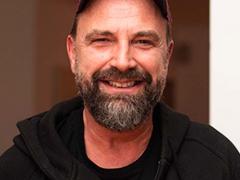
Kai Ehrhardt
ehrhardt@somatische-akademie.de
www.kaiehrhardt.com
Founder of the Somatic Academy Berlin, Breath Therapist/based on the work developed by Prof. Ilse Middendorf, Continuum Teacher and Heilpraktiker (Psychotherapy)
"I had the honor and privilege to learn from the two founders Prof. Ilse Middendorf (Perceptible Breath / Erfahrbarer Atem) and Emilie Conrad (Continuum) and I am pleased to be able to pass on this work." Since 2012, Kai has been developing professional trainings at the Somatic Academy as well as programs dedicated to the application of Somatics in everyday life. He has been a co-curator of the Body IQ festival since 2015. Since 2003, he has developed the approach "Authentic Eros", which integrates - as a somatic application - bodywork, relationship communication and group-dynamic processes in the area of personal and interpersonal development. He is a member of the professional associations Atem, Continuum and ISMETA.
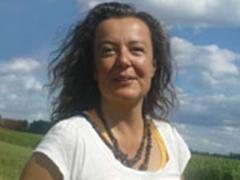
Marion Evers
evers@somatische-akademie.de
Founder of the Somatic Academy Berlin, studied Theatre, French Linguistics & Political Science Cologne, Berlin, Marseille, M.A. "From Actor to Performer "1998, studies in Performance Arts, work in the field of directing/dramaturgy, speaker, moderator. The interest in a stronger integration of theory and practice leads to the foundation of the Somatic Academy, Embodiment Research, Body Phenomenological Foundations, Critical Somatics, Social Body & Body Politics in relation to somatic practices in their social and political relevance of "somatics" today.
Somatic Movement Educator (RSME/ISMETA), Somatic Yoga & Somatic Voice Trainer, Breath Therapist according to Prof. Ilse Middendorf, Yoga Teacher (BDY/EYU)
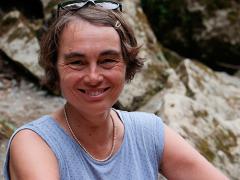
Katja Münker-Harder
www.movement-muenker.de/
Dance | Choreography | Performance | Somatics | Artistic Research | Walking Art | Mountain Hiking Guiding
Continuing education lecturer and director of Environmental Somatics and EMERGE/ Somatic in Dance at the Somatische Akademie Berlin. Member of the German Feldenkrais Association & ISMETA-registered RSME/RSMT/RSDE.
Trained as a physical therapist, Feldenkrais teacher, and mountain hiking guide, as well as in contemporary dance, (contact) improvisation, instant composition.
Conscious and embodied learning, the potential between individual freedom and collective inclusion in the environment, as well as joy, ease, and consciousness in the movement are the focus of her teaching. Her research-oriented practice is informed by deep-sensing investigation and reflecting evaluation. Beyond teaching her work includes performance projects, conference papers, and publications focusing on somatics and choreography, as well as on walking. Regular teaching at universities including FU Berlin, UdK Berlin, and HZT Berlin. Artistic research collaboration with AREAL_artistic research lab Berlin.
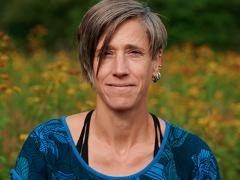
Heike Kuhlmann
www.heikekuhlmann.net
MSME, BMC®-Practitioner, dancer, -educator, choreographer, MA Performance Studies/Choreography
Heike is interested in the unfolding process of human beings. It is more than the individual unfolding, but in how people can meet each other at eye level through personal development and inclusion of structural conditions in her somatic facilitations. Being a condition to become Critical Somatics. She accompanies somatic processes in individual sessions, courses, workshops and trainings. Activism and somatics are interwoven in her artistic work. More information on: www.somatik-tanz-choreographie.de, www.heikekuhlmann.net
Kosten
Cost
6400 €
Monthly installments are possible for 12-36 month.
Dates
Module 1 | Sep 08 - 12, 2025 | Basics of the Somatic Pedagogy Part 1 |
Module 2 | Nov 17 - 21, 2025 | Basics of the Somatic Pedagogy Part 2 |
Module 3 | Feb 16 - 20, 2026 | Viability |
Module 4 | |
Module 5 | |
Module 6 | Sep 14 - 18, 2026 | Reflection |
Module 7 | Oct 05 - 09, 2026 | Resonance |
Module 8 | Nov 16 - 20, 2026 | Complexity |
Module 9 | |
Module 10 | Feb 08 - 12, 2027 | Embodiment |
Anmeldeinformationen
BerlinSAB Studio 1
Paul-Lincke-Ufer 30
10999 Berlin | side building
1st backyard
4th floor
- Full Price: 6400.00 EUR
